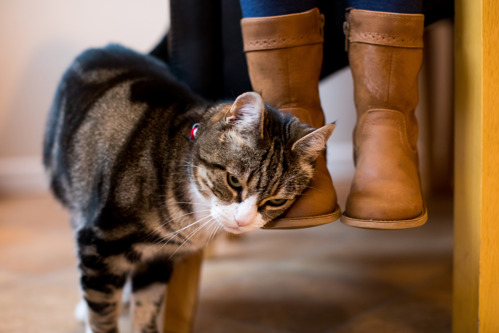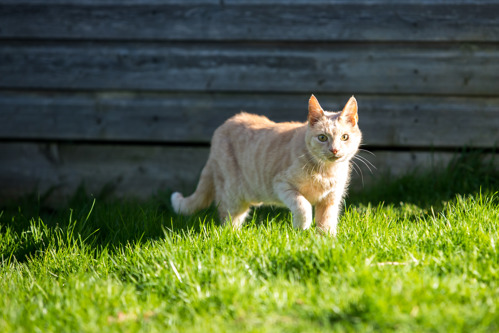If you have recently moved house you may be worried about your cat returning to their old home. Find out if cats remember their old homes and how to stop them going back
Cats are very territorial animals who like the comforts of home. Moving to a new house can be a disorientating and stressful experience for them.
When cats are happy in their home, they will start to establish it as their core territory. They will also determine a wider home range beyond the house and garden that they can explore. They do this by marking the areas they consider safe with their scent. This also serves as a warning to other cats to stay away from their territory.

Cats scent mark by:
- rubbing their cheeks on objects, leaving behind their signature cat pheromones
- spraying pee
- scratching surfaces to leave behind their pheromones as well as claw marks
Once cats have established a safe core territory and home range, they have no reason to leave it. If you move home with your cat, they will find leaving their established territory stressful. They won’t feel safe in their new home straight away. If your new home is quite close to your old home, they may try to find their way back to the territory they still consider theirs.
Do cats remember their old home?
Cats won’t reminisce about their old home or miss it in the same way we would. They live in the moment and don’t have a concept of the past. But if you haven’t moved far they may come across their old territory or home range shortly after you have moved house. They are likely to recognise it by smell. The familiar scent will be comforting for them. They will be likely to follow it back to where they know they’ll feel safe. Once they have established a safe core territory in their new home, they will be less likely to want to go back to their old home.

How do cats find their way back to their old home?
How cats navigate over long distances is not really known. Some theories suggest they can use the Earth’s magnetic field to find their way home. But if your new home is close to your old home, they will most likely use sight, sounds and smells to find their way from one to the other. Cats have a particularly strong sense of smell and very good hearing. They can pick up even the faintest whiff or noise that reminds them of their old home and follow it back to their territory.
How can I stop my cat returning to their old home?

- Keep them inside for the first few weeks. When you first move into your new home, keep your cat indoors for the first two to three weeks. This will give them the chance to settle in and establish the new home as their core territory by marking it with their scent. Make sure you block any potential escape routes, including windows and the cat flap. Be mindful of where your cat is when you enter or leave the house.
- Bring something that smells familiar. When moving, bring your cat’s favourite items from your previous home that will have their familiar scent on. These could include blankets, beds and toys. Don’t wash these for the first few weeks unless necessary. Having something that smells of them and their old home will be comforting for them. It will help them to settle into their new environment.
- Gradually introduce them to the outdoors. Once your cat has been indoors for a few weeks and settled into their new home, you can then let them explore outdoors. The first time you let them outside, make sure it is before their usual mealtime. They will be more likely to want to return for their food. You can then gradually let them out earlier and earlier, so they have longer periods outdoors before coming back for dinner time. Find out more about keeping your cat safe outside.
- Create a safe, stress-free home. Your cat will be much less likely to want to return to their old home if they are happy in their new one. Make sure it is set up with everything they need. Try to avoid anything that could cause them stress, such as loud noises or having to share with other cats. Make sure they always have a quiet hiding place to retreat to for safety.
- Use a pheromone diffuser. Plug in a pheromone diffuser, such as FELIWAY®, where your cat spends most of their time. This will emit calming feline pheromones into the house and help your cat to feel happy and settled in their new home.
- Warn the new residents. If you’re worried about your cat returning to their old home, let the new residents of your old home, and maybe your old neighbours, know to look out for them. Give them your contact details so they can contact you if they do spot your cat. Ask them not to encourage your cat into the house (for example, by offering food, play or fuss).
- Update their microchip. Getting your cat microchipped gives them the best chance of being identified and returned to you if they are lost of stolen. When you move, remember to update the details registered on their microchip to your new address. This means you can be contacted quickly if they’re found away from home. Find out more about microchipping.
Find more advice about moving home with your cat and what to do if your cat goes missing.



